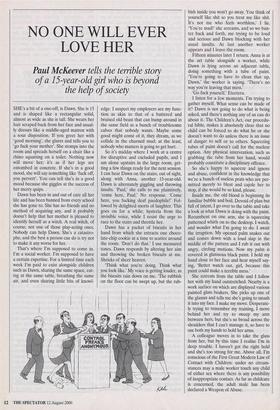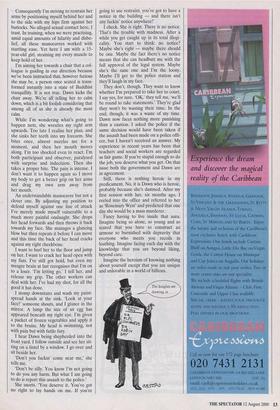NO ONE WILL EVER LOVE HER
Paul McKeever tells the terrible stoty
of a 15-year-old girl who is beyond the help of society
SIIE's a bit of a one-off, is Dawn. She is 15 and is shaped like a rectangular solid, almost as wide as she is tall. She wears her hair scraped back from her face and usual- ly dresses like a middle-aged matron with a sour disposition. If you greet her with 'good morning', she glares and tells you to 'go fuck your mother'. She stomps into the room and spreads herself on a chair like a rhino squatting on a toilet. Nothing now will move her; it's as if her legs are entombed in concrete. If she's in a good mood, she will say something like 'fuck off, you pervert'. You can tell she's in a good mood because she giggles at the success of her merry quips.
Dawn has been in and out of care all her life and has been banned from every school she has gone to. She has no friends and no method of acquiring any, and it probably doesn't help that her mother is pleased to identify herself as a witch. A real witch, of course, not one of those play-acting ones. Nobody can help Dawn. She's a catastro- phe, and the best a person can do is try not to make it any worse for her.
That's where I'm supposed to come in. I'm a social worker. I'm supposed to have a certain expertise. For a limited time each week I'm paid to exist alongside children such as Dawn, sharing the same space, eat- ing at the same table, breathing the same air, and even sharing little bits of knowl- edge. I suspect my employers see my func- tion as akin to that of a battered and bruised old beast that can bump around in the same field as a bunch of troublesome calves that nobody wants. Maybe some good might come of it, they dream, as we collide in the churned mud; at the least, nobody who matters is going to get hurt.
So it's midday where I work at a centre for disruptive and excluded pupils, and I am alone upstairs in the large room, get- ting a few things ready for the next session. I can hear Dawn on the stairs, out of sight, along with Anna, another 15-year-old. Dawn is alternately giggling and throwing insults, 'Paul,' she calls to me plaintively, 'come here, Paul.' No response. 'Come here, you fucking deaf paedophile!' Fol- lowed by delighted snorts of laughter. This goes on for a while; hysteria from the invisible voice, while I resist the urge to race to the stairs and throttle her.
Dawn has a packet of biscuits in her hand from which she extracts one choco- late-chip cookie at a time to scatter around the room, 'Don't do that.' I use measured tones. Dawn responds by altering her aim and throwing the broken biscuits at me. Shrieks of sheer heaven.
'Think what you're doing. Think what you look like.' My voice is getting louder, as the biscuits rain down on me. The rubbish on the floor can be swept up, but the rub- bish inside you won't go away. You think of yourself like shit so you treat me like shit. It's not me who feels worthless,' I lie. 'You're mad!' she screams, and so we ban- ter back and forth, me trying to be loud and serious and Dawn blocking with her usual insults. At last another worker appears and I leave the room.
Fifteen minutes later I return. Anna is at the art table alongside a worker, while Dawn is lying across an adjacent table, doing something with a tube of paint. 'You're going to have to clean that up, Dawn,' the worker is saying. 'There's no way you're leaving that mess.'
'Go fuck yourself.' Etcetera.
I listen for a few moments. I'm trying to gather myself. What sense can be made of it? Dawn is not going to do what is being asked, and there's nothing any of us can do about it. The Children's Act, our procedu- ral bible, makes it absolutely clear that no child can be forced to do what he or she doesn't want to do unless there is an issue of danger to self or to others. Squeezing tubes of paint doesn't call for the nuclear option. Any physical intervention, such as grabbing the tube from her hand, would probably constitute a disciplinary offence.
So she's happy to squeeze and ignore and abuse, confident in the knowledge that we're a bunch of useless prats who are per- mitted merely to bleat and cajole her to stop, if she would be so kind, please.
Inside me, the old blood is beginning its familiar bubble and boil. Devoid of plan but full of intent, I go over to the table and take a look at what Dawn is doing with the paint. Recumbent on one arm, she is squeezing patterned whirls on to the desktop. I watch, and wonder what I'm going to do. I await the irruption. My opened palm snakes out and comes down with a loud slap in the middle of the pattern and I rub it out with angry, circling motions. Now my palm is covered in glutinous black paint. I hold my hand close to her face and hear myself say- ing, 'Better watch out, girl, because this paint could make a terrible mess.'
She retreats from the table and I follow her with my hand outstretched. Nearby is a work surface on which are displayed various painted glass beakers. She picks up one of the glasses and tells me she's going to smash it into my face. I make my move. Desperate- ly trying to remember my training, I move behind her and try to sweep my arm between hers, but she's so broad across the shoulders that I can't manage it, so have to use both my hands to hold her arms
A colleague moves in to take the glass from her, but by this time I realise I'm in deep trouble. I haven't got the right hold and she's too strong for me. Above all, I'm conscious of the First Great Modern Law of Contact with Children: under no circum- stances may a male worker touch any child of either sex where there is any possibility of inappropriate contact. As far as childcare is concerned, the adult male has been declared a Weapon of Abuse. Consequently I'm striving to restrain her arms by positioning myself behind her and to the side with my hips firm against her buttocks. No alleged sexual contact here, I trust. In training, when we were practising, amid equal amounts of hilarity and disbe- lief, all these manoeuvres worked with startling ease. Yet here I am with a 15- year-old girl, straining my every muscle to keep hold of her.
I'm aiming her towards a chair that a col- league is guiding in our direction because we've been instructed that, however furious she may be, a person once seated is trans- formed instantly into a state of Buddhist tranquillity. It is not true. Dawn kicks the chair away. We're all telling her to calm down, which is a bit foolish considering that among all of us she is already the most calm.
While I'm wondering what's going to happen next, she wrestles my right arm upwards. Too late I realise her plan, and she sinks her teeth into my forearm. She bites once, almost nuzzles me for a moment, and then her mouth moves along. I'm too shocked even to react. I'm both participant and observer, paralysed with surprise and indecision. Then she takes a proper bite. The pain is intense. I don't want it to happen again so I move my body to get a better grip on her arms and drag my own arm away from her mouth.
An understandable manoeuvre but not a clever one. By adjusting my position to defend myself against one line of attack I've merely made myself vulnerable to a much more painful onslaught. She drops her head forwards and then throws it back towards my face. She manages a glancing blow but then repeats it before I can move and this time the back of her head cracks against my right cheekbone.
I want to hurl her to the floor and jump on her. I want to crack her head open with my fists. I've still got hold, but even my meagre brain at last recognises that I'm on to a loser. 'I'm letting go,' I tell her, and release my grip. The other workers can deal with her. I've had my shot, for all the good it has done.
I stomp downstairs and wash my paint- spread hands at the sink. 'Look at your face!' someone shouts, and I glance in the mirror. A lump the size of an egg has appeared beneath my right eye. I'm given a packet of frozen vegetables and apply it to the bruise. My head is swimming, not with pain but with futile fury.
I hear Dawn being shepherded into the front yard. I follow outside and see her sit- ting on a ‘lintel by a window. I go over and sit beside her.
'Don't you fuckin' come near me,' she tells me.
'Don't be silly. You know I'm not going to do you any harm. But what I am going to do is report this assault to the police.'
She snorts. 'You deserve it. You've got no right to lay hands on me. If you're going to use restraint, you've got to have a notice in the building — and there isn't any fuckin' notice anywhere!'
I check. She is right. There is no notice. That's the trouble with madness. After a while you get caught up in its total illogi- cality. You start to think: no notice? Maybe she's right — maybe there should be one. Maybe the fact there's no notice means that she can headbutt me with the full approval of the legal system. Maybe she's the sane one and I'm the loony.
Maybe get to the police station and they'll laugh in my face.
They don't, though. They want to know whether I'm prepared to take her to court. I say yes, for sure. `OK,' they tell me, 'we'll be round to take statements.' They're glad they won't be wasting their time. In the end, though, it was a waste of my time. Dawn now faces nothing more punishing than a caution. I asked the police if the same decision would have been taken if the assault had been made on a police offi- cer, but I haven't received an answer. My experience in recent years has been that teachers and social workers are regarded as fair game. If you're stupid enough to do the job, you deserve what you get. On that issue both the government and Dawn are in agreement.
Still, there is nothing heroic in my predicament. No, it is Dawn who is heroic, probably because she's damned. After my first session with her, six months ago, I reeled into the office and referred to her as 'Rosemary West' and predicted that one day she would be a mass murderer.
Fancy having to live inside that aura. Imagine being so alone, so young and so scared that you have to construct an armour so burnished with depravity that everyone who meets you recoils in loathing. Imagine facing each day with the knowledge that you are beyond liking, beyond care.
Imagine the heroism of knowing nothing about yourself except that you are unique and unlovable in a world of billions.



























































 Previous page
Previous page